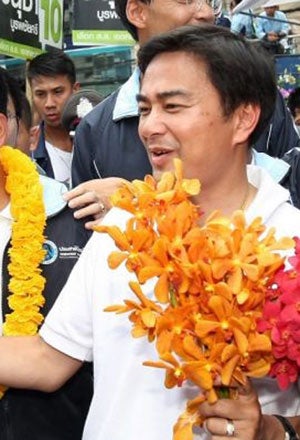Thai new money set to defeat Old Etonian premier

Your support helps us to tell the story
From reproductive rights to climate change to Big Tech, The Independent is on the ground when the story is developing. Whether it's investigating the financials of Elon Musk's pro-Trump PAC or producing our latest documentary, 'The A Word', which shines a light on the American women fighting for reproductive rights, we know how important it is to parse out the facts from the messaging.
At such a critical moment in US history, we need reporters on the ground. Your donation allows us to keep sending journalists to speak to both sides of the story.
The Independent is trusted by Americans across the entire political spectrum. And unlike many other quality news outlets, we choose not to lock Americans out of our reporting and analysis with paywalls. We believe quality journalism should be available to everyone, paid for by those who can afford it.
Your support makes all the difference.On the street below, a woman reached up towards Abhisit Vejjajiva and held out a bag of tropical fruit. Thailand's Prime Minister pressed his palms together in a gesture of thanks and respect and quickly reached down to accept the gift.
It was the final day of campaigning ahead of Sunday's election and as Mr Abhisit made his way through the streets of Bangkok yesterday morning on the upper floor of an open-top truck, he was in no position to turn down an act of kindness from anyone.
The most recent opinion polls suggest the incumbent could be a full 10 points behind his rival and, on a damp, humid day on which the entire city felt like a steam-room, one sensed Mr Abhisit was aware he needed to try to reach out to anyone. Asked about his chances, he told The Independent: "You should ask these people. They want to move forward to get stability ... Yes we can [win]."
Mr Abhisit and his Democrat Party are battling against an opponent who is on a roll. Despite unanswered questions about his role in the crackdown on political opponents last spring that left more than 90 people dead, just a month ago when campaigning started, Mr Abhisit's Democrat party was close to level-pegging with Pheu Thai, the party controlled and financed by former prime minister Thaksin Shinawatra.
Then Mr Thaksin took the decision to name his younger sister Yingluck, as the party's prime ministerial candidate. Contrary to the expectations of many observers, the 44-year-old with no political experience has somehow resonated among voters. Even her opponents acknowledge she has boosted her party's fortunes.
Mr Abhisit, who started his day on his truck then hit the streets by foot to shake hands and pose for photographs with crowds of supporters, said he was not surprised by her performance. "It's the base of the old Thaksin party," he said, sweat on his brow, as he made his way through a market place that sold clothes and electrical items. "When you get a new face, you get a bit of a bounce."
In this hard-fought campaign, it remains unclear whether any party will secure sufficient seats to win a straight majority in the parliament. As such, which party eventually emerges victorious could depend on who is best placed to form a coalition. In 2008, amid a constitutional crisis which saw two allies of Mr Thaksin were forced from the Prime Minister's office amid allegations of wrong-doing, it was the influence of the army that helped the Democrat party obtain sufficient support.
A party spokesman, Buranaj Smutharaks, said: "Our existing coalition has been in place for two-and-a-half years. It is possible we will remain there, after the election's outcome."
The difference between supporters of the Democrat party and Pheu Thai is perhaps sometimes overly simplified as the division between a conservative urban middle and upper class, and the urban and rural poor. But yesterday, as Mr Abhisit, born in the UK and educated at Eton and Oxford, made his way among the market stalls pressing the flesh, it was not hard to find a pattern.
A group of well-dressed women of a certain age, all professionals, could not get enough of the Prime inister, taking out their mobile phones to have their photographs clicked with him. One of them, Manee, said: "I think he works well. He is a good worker. He has been good so far. Two years ago there was lots of trouble. Because of the situation, they are doing the best they can under the circumstances." By contrast, the stall-holders themselves did not appear to be fans. "I am voting number one," said one man, referring to the Pheu Thai's number on the ballot list.
Mr Abhisit had little time to waste. After the market, he headed back to the Democrat party headquarters, where candles were burning alongside a shrine to the earth goddess, for a series of interviews. He then got into his black SUV for a journey across town to the studios of a television network, Channel Three, owned by a family of industrialists, and delivered what was effectively his final interview of the campaign.
Upstairs, one of Thailand's most popular news anchors, Sorayut Suthussanajinda, did his best to press the Prime Minister. He was asked to evaluate his performance in the last week of campaigning. "I don't try to evaluate myself," said Mr Abhisit. "I am looking at talking about the policies we are trying to push."
If he felt tired, he did not show it. Posing for more photographs with a small group of enthusiastic female supporters outside the television office, Mr Abhisit then climbed back into his vehicle. His aides had arranged three more campaign stops for the evening. At this stage, every moment counts.
Join our commenting forum
Join thought-provoking conversations, follow other Independent readers and see their replies
Comments